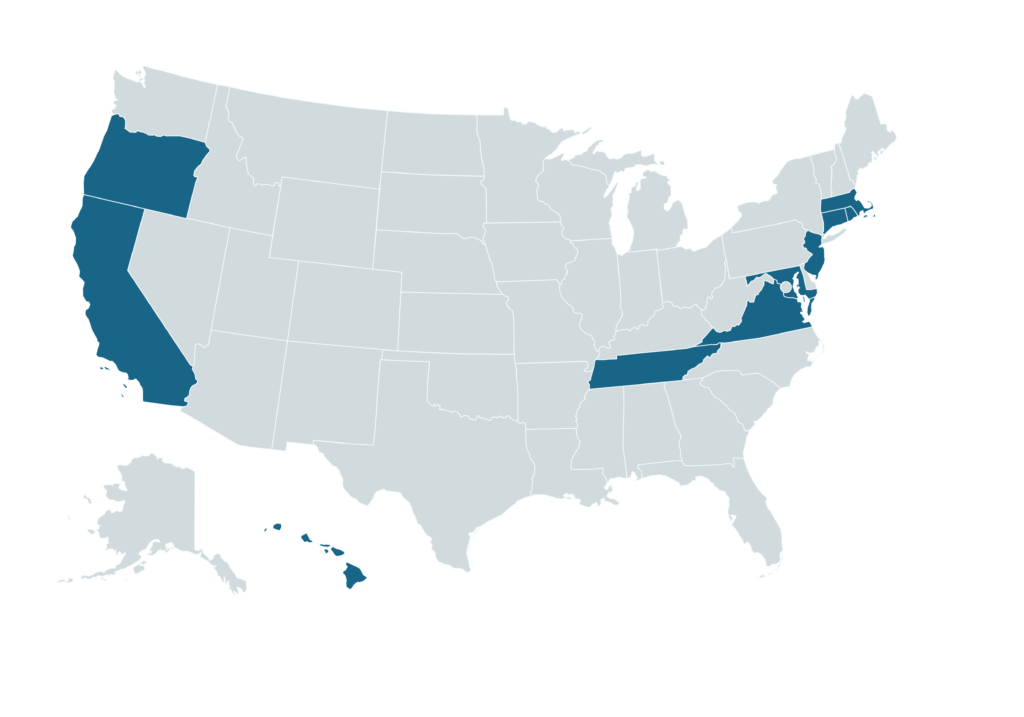
Policy Update
Polluters Pay: How States Are Filling the Federal Climate Funding Gap in 2025
March 3, 2025
Overview
With federal climate funding under threat, an increasing share of states are introducing superfund bills in 2025 to make fossil fuel companies pay for their contributions to climate change.
Vermont and New York led the way in 2024 by passing first-of-their-kind climate superfund legislation that charges major emitters for climate-related damages and reinvests the revenue into climate adaptation projects. Now, at least 10 states are following suit by pursuing their own “polluters pay” bills in 2025.
Why Are More States Turning to Climate Superfunds?
As taxpayers shoulder the growing costs of climate change, the fossil fuel companies responsible for billions of dollars in climate damages continue raking in record profits while the Trump administration moves to revoke federal climate funding. In response, more states are rethinking how to fund their climate programs and seeking to create new “superfund” accounts to provide a sustainable source of funding from the companies most responsible for the damages.
The 2025 State of Play: Which States Are Moving Superfund Bills?
The 10 states moving superfund bills in 2025 mirror the models created by New York and Vermont to establish state-managed funds that will support climate adaptation projects and be financed by proportionate fees on fossil fuel producers. Many of the proposed 2025 bills include environmental justice funding requirements, with some states introducing additional legislation to establish the right of private citizens and insurance companies to sue fossil fuel companies for climate-related damages.
Below are the specific policy approaches and trends NCEL staff are seeing in 2025:

Adaptation & Mitigation: Funds to Improve Climate Resilience
Most states’ bills specify the types of climate adaptation projects that will be supported by new fees on fossil fuel companies, ranging from nature-based solutions to physical infrastructure improvements and public health measures. These states include Connecticut (H.B.6280), Massachusetts (H.D.3369), New Jersey (S.3545), and Oregon (S.B.682).
In addition to funding for climate adaptation projects, some states – including California (S.B.684), Maryland (H.B.128/S.B.149), and Rhode Island (H.B.5424) – would also use their new superfunds to finance climate mitigation projects such as the development of renewable energy and zero-emission transportation infrastructure.
Environmental Justice: Funds to Increase Climate Equity
Many proposed superfund bills require that a minimum portion of funds (often 40%) go toward projects benefiting underserved communities facing disproportionate rates of pollution and climate damages (i.e. “environmental justice communities”). States with explicit environmental justice funding in their 2025 legislation include California (S.B.684), Connecticut (S.B.1199), Hawaii (S.B.1652), Massachusetts (H.D.3369), Maryland (H.B.128/S.B.149), and Virginia (H.B.2233).
Bonus: Ensuring Individuals’ Rights to Climate Damages
Some states have introduced additional legislation to create a private right of action for residents to sue fossil fuel companies for climate-related damages. New York (S.4799) is pursuing private right of action legislation to build off of its recently enacted superfund law, as is Oregon (S.B.679), as well as Hawaii (S.B.1166) and California (S.B.222) following devastating wildfire events. These bills are separate but complementary to the superfund model.
- Insurance Companies: To further protect residents from the high costs of climate disasters such as wildfires and flooding, California and Hawaii’s bills would also allow insurance companies to recover losses related to climate disasters from oil and gas companies on behalf of their policyholders, often called subrogation.
In Their Words: Lawmakers on Polluters Pay Policies for Climate Action
Many of the state lawmakers sponsoring 2025 superfund bills are members of NCEL and have taken lessons learned from other states in crafting their legislation. Below they share their thoughts on this policy approach.
- Rhode Island State Representative Jennifer Boylan: “When I read about New York’s Climate Superfund law that passed in December, it immediately got my attention. Climate change is impacting Rhode Island in many ways: coastal erosion and regular flooding; heatwaves and drought; extreme rainfalls; forest fires and more. A Climate Superfund law will allow Rhode Island to access funds to address climate change expenses by having those who knowingly caused this crisis to help pay for it.”
- Maryland State Delegate David Fraser-Hidalgo: “It’s a complicated bill with a simple premise: if you make a mess, you clean it up. There is irrefutable proof that many of the largest oil companies were aware of the long-term effects of burning fossil fuels as early as 1968 but chose to conceal this scientific evidence.”
- Oregon State Senator Jeff Golden: “Any reasonable analysis of why we’re experiencing the devastating impacts of climate chaos, and how clearly the fossil fuel industry anticipated where we are today, points to the fairness of holding that industry responsible for some of the enormous costs that are breaking the backs of communities and local governments in Oregon and far beyond.”
- Oregon State Representative Tom Andersen: “As Oregonians continue to grapple with the increased costs of the climate crisis, it is crucial that we support people impacted by climate disasters and hold those entities responsible for the crisis accountable.”
- Rhode Island State Senator Linda Ujifusa: “Big fossil fuel corporations, who knew for decades that their product would cause climate change and put their profits over our planet, should also be held responsible. With over 400 miles of vulnerable coastline and an economy that depends heavily on tourism and marine trades, Rhode Island cannot afford to wait any longer.”
Stay Informed on State Policy With NCEL
Stay up to date on trends in climate and energy policy across the country this year with NCEL’s Bill Tracking Map.